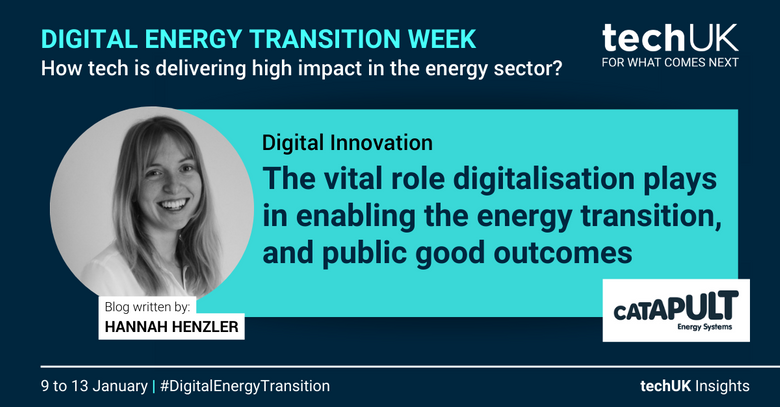Digitalisation for Net Zero: Data for Public Good (Guest blog by Energy Systems Catapult)

Digitalisation for Net Zero
Digitalisation is fundamental to our Net Zero commitment - the decarbonisation of the UK’s energy system will not happen without its digital transformation. Effective digitalisation will allow the system to coordinate and respond to the increasingly complex energy flows, resultant of the move toward an increasingly renewable, decentralised supply. To put it into perspective –millions of new installations of solar panels, battery storage systems, heat pumps and electric vehicles is expected in the coming years. These technologies can be sources or sinks of electricity at any given moment, generating or consuming electricity at different rates, at different times, in meeting varied consumer needs and preferences. Coordinating at this scale and complexity while ensuring a resilient supply will require a smarter energy system – one with a culture of digitalisation at its core.
Data at the core
At the centre of a smart energy system is data. It is the collection, exchange and response to data which enables the complexity to be managed. Impressive progress has been made in this space by the energy sector but there are still challenges which urgently need to be addressed to deliver the digital energy system we need. These include:
-
Increasing access to data,
-
Embedding a culture of data & digitalisation in the sector,
-
Using data for public good
Utilising smart meter data
The system needs to understand consumption at a granular level, and knowledge of the temporal and geographical distribution of energy consumption is vital. Therefore, core to the future smart energy system is data from smart meters. This means data privacy is essential, and care must be taken to ensure that utilisation of smart meter data is done with respect to consumers privacy while ensuring industry can widen the benefits of using smart meter data - for individuals, the grid, and in delivering public good outcomes.
Effective use of smart meter data, along with other data sources such can support demand side response by identifying and alerting smart appliances/consumers when clean power is abundant within the grid. Energy retailers are facilitating this practice with time-of-use tariffs which allow consumers to choose green energy and be financially rewarded for shifting their demand. Such tariffs are central to consumers engagement with the energy transition and are made possible with smart meter data. This approach not only balances the grid by helping shave off peaks and filling in troughs but can also decrease individuals’ energy bill as abundant, clean energy equates to affordable energy.
Utilisation of smart meter data can also be a key resource in supporting our communities through the cost-of-living crisis. Identifying those in official fuel poverty currently relies on a narrow definition and limited data meaning that many in need may be overlooked. Organisations like local authorities can use smart meter data and other sources to identify and then support those who are struggling to heat their homes.
Ethical and responsible use
Data in the energy sector can enable a wide variety of benefits and that data needs to be used ethically and responsibly in achieving them. Data sets, algorithms and machine learning methods are all incredibly useful tools but equally can create, maintain, or develop bias’s and have the possibility to create discriminatory outcomes for consumers. Therefore, if we are to create a digital culture and use data for public good, it’s use must be built on effective governance and policy which focuses on creating a just transition for all through ethical data use.
Data is not only indispensable to system operation but also a powerful asset needed to support and empower individual consumers and communities; through the acute cost-of-living crisis and beyond.
Get involved with our work
All of techUK’s work is led by our members – keep in touch or get involved with our work on transport and infrastructure by joining our groups.




